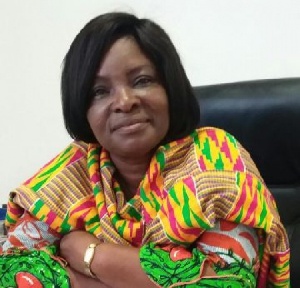A total of five factory proposals projected under the government’s One-District-One-Factory (1D1F) initiative has received the full financial cover to start.
They are Yeji Tree Stump Project in the Volta Region, funded by GCB Bank to process stump into charcoal for export, and the Amantin Cassava Project located in the Brong Ahafo being sponsored by Standchart Bank to process cassava into ethanol and starch.
The rest are; Begoro Cassava Project in the Eastern Region being financed by Exon Bank, and Adaklu Cassava Project in the Volta Region that would both focus on processing cassava into ethanol and starch for export while the Ekumfi Pineapple Factory Project located in the Central Region being bankrolled by the Exon Bank would add value to the fruit.
Mrs Gifty Ohene-Konadu, National Coordinator of 1D1F, gave the update at a symposium organised as part of the on-going 69th Annual New Year School and Conference (ANYSC) in Accra, which is on the theme: ”Accelerated Industrial Development for Job Creation”.
She added that last year the 1D1F secretariat processed 65 other business factory proposals and submitted it to the various financial institutions for scrutiny from their own perspective for consideration.
“These financial institutions are not doing ‘business as usual’ as in going through the normal process but they have set up highly specialised desk looking closely at each business plan they receive based on many factors.
“I must say that as part of our work, the 1D1F team subjected the various proposals into scrutiny to ensure that they are viable, bankable and profitable before we forwarded it to the financial institutions.
“We are working with the various communities through the assemblies to find out the availability of the raw materials, market for the product and community acceptability before looking at the proposed factory,” she emphasised.
Responding to a question posed by some of the participants, the National Coordinator explained that the secretariat was not going to impose projects for the districts but was rather asking entrepreneurs to submit their proposals for consideration subject to the availability of raw materials and the ready market.
Giving a background to the initiative, Mrs Ohene-Konadu explained that, 1D1F which was an idea after its conception had gone through some stages including; preparatory, project conceptualization, investment framework, a call for business plans and the assessment before its implementation.
Clearing some misconceptions about the initiative she said, private people would privately own the factories while the government would provide the enabling environment by building roads, provision of electricity, potable water and telecommunication as well as other incentives to these companies.
“Over the years, businesses have suffered so this is to cushion the business to enable them to thrive and make more profit, to expand and pay taxes,” she noted.
She noted that some donor agencies including; the African Development Bank were supporting the 1D1F secretariat to conduct due diligence assessment.
Mrs Ohene-Konadu announced that the secretariat is interested in working with churches and faith-based organisations who had a winning proposal to ensure that the vision of the government to industrialise the country by harnessing the district potentials in the various districts to create sustainable employment for the youth become a reality.
Business News of Thursday, 18 January 2018
Source: ghananewsagency.org













